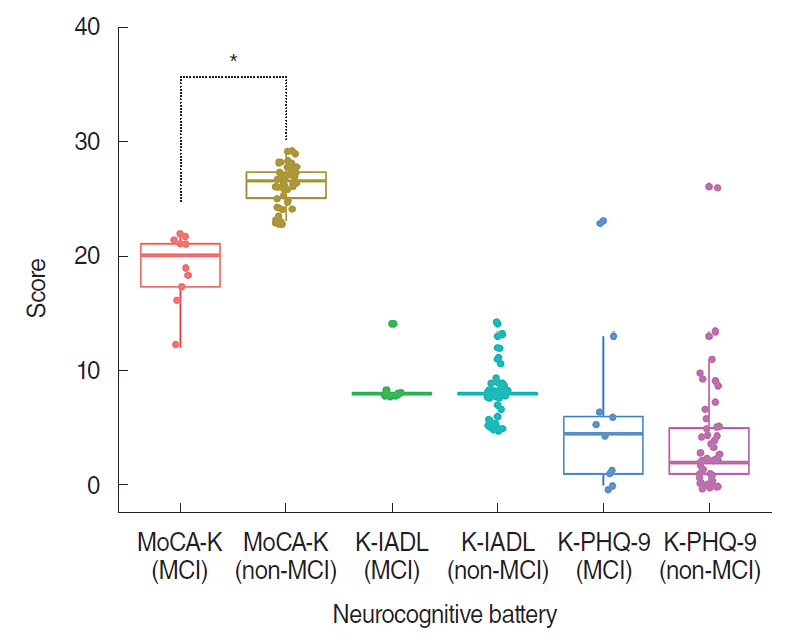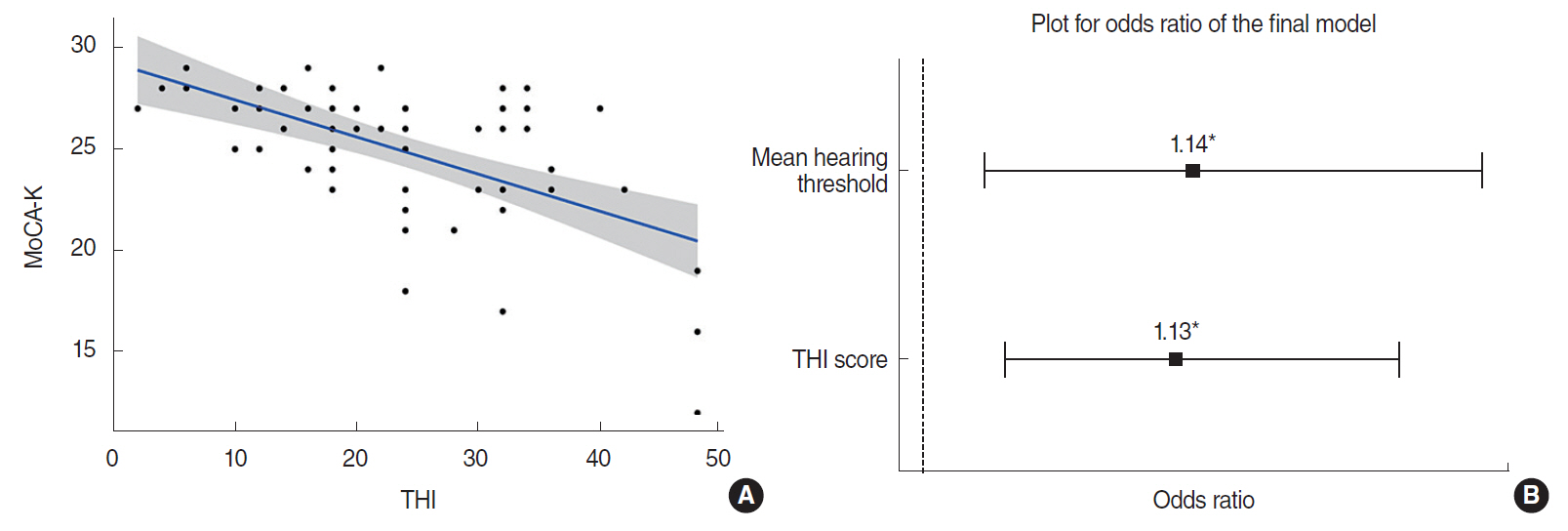Clin Exp Otorhinolaryngol.
2020 Feb;13(1):8-14. 10.21053/ceo.2018.01914.
Neurocognition of Aged Patients With Chronic Tinnitus: Focus on Mild Cognitive Impairment
- Affiliations
-
- 1Department of Otorhinolaryngology-Head and Neck Surgery, SMG-SNU Boramae Medical Center, Seoul National University College of Medicine, Seoul, Korea
- 2Department of Psychiatry, SMG-SNU Boramae Medical Center, Seoul National University College of Medicine, Seoul, Korea
- KMID: 2501291
- DOI: http://doi.org/10.21053/ceo.2018.01914
Abstract
Objectives
. To investigate the neurocognition of aged patients with chronic tinnitus and reveal the possible association between tinnitus severity and cognitive function, with attention to mild cognitive impairment (MCI).
Methods
. Fifty-eight elderly patients (≥65 years old) with chronic tinnitus (≥6 months) were prospectively enrolled in this study. All patients assessed the neurocognitive batteries including the Korean version of the patient health questionnaire-9 (K-PHQ-9), the Lawton instrumental activities of daily living scale (K-IADL), and the Montreal cognitive assessment (MoCA-K). After initial evaluation to exclude moderate or severe cognitive impairment by a psychiatrist, the patients were classified into two groups: MCI and non-MCI, according to the MoCA-K scores (cutoff value, 22/23). All patients underwent audiological examinations including psychoacoustic tests of tinnitus.
Results
. Of 58 patients, 10 (17.2%) met the MCI criteria. The tinnitus handicap inventory (THI) score in the MCI group was significantly higher than that in the non-MCI group. Based on multivariate regression analysis, a significant association between tinnitus severity and MoCA-K score was also detected. Specifically, bothersome tinnitus (THI score ≥30) was closely linked to the presence of MCI. Meanwhile, the impact of MCI on both K-PHQ-9 and K-IADL scores was not evident in patients with chronic tinnitus.
Conclusion
. Tinnitus severity appears to be a potential independent determinant for predicting the MCI, suggesting the underlying mechanism between chronic tinnitus and cognitive deficit. Given that MCI highly links to dementia, the evaluation of cognitive functions in aged patients with chronic tinnitus need to be considered at the initial assessment of tinnitus.
Figure
Cited by 2 articles
-
Beyond Hearing Loss: Does Tinnitus Cause Cognitive Impairment?
Ho Yun Lee
Clin Exp Otorhinolaryngol. 2020;13(1):2-3. doi: 10.21053/ceo.2019.01949.Tinnitus and Cognitive Decline
Hyun-Jin Lee, Ye Ji Shim, Munyoung Chang
Korean J Otorhinolaryngol-Head Neck Surg. 2023;66(10):641-645. doi: 10.3342/kjorl-hns.2023.00913.
Reference
-
1. Jastreboff PJ. Phantom auditory perception (tinnitus): mechanisms of generation and perception. Neurosci Res. 1990; Aug. 8(4):221–54.
Article2. Lee SY, Nam DW, Koo JW, De Ridder D, Vanneste S, Song JJ. No auditory experience, no tinnitus: lessons from subjects with congenital- and acquired single-sided deafness. Hear Res. 2017; Oct. 354:9–15.3. Kim SH, Jang JH, Lee SY, Han JJ, Koo JW, Vanneste S, et al. Neural substrates predicting short-term improvement of tinnitus loudness and distress after modified tinnitus retraining therapy. Sci Rep. 2016; Jul. 6:29140.
Article4. Song JJ, Vanneste S, De Ridder D. Dysfunctional noise cancelling of the rostral anterior cingulate cortex in tinnitus patients. PLoS One. 2015; Apr. 10(4):e0123538.
Article5. Andersson G, McKenna L. The role of cognition in tinnitus. Acta Otolaryngol Suppl. 2006; Dec. (556):39–43.
Article6. Mohamad N, Hoare DJ, Hall DA. The consequences of tinnitus and tinnitus severity on cognition: a review of the behavioural evidence. Hear Res. 2016; Feb. 332:199–209.
Article7. Pace E, Zhang J. Noise-induced tinnitus using individualized gap detection analysis and its relationship with hyperacusis, anxiety, and spatial cognition. PLoS One. 2013; Sep. 8(9):e75011.
Article8. Tegg-Quinn S, Bennett RJ, Eikelboom RH, Baguley DM. The impact of tinnitus upon cognition in adults: a systematic review. Int J Audiol. 2016; Oct. 55(10):533–40.
Article9. Trevis KJ, McLachlan NM, Wilson SJ. Cognitive mechanisms in chronic tinnitus: psychological markers of a failure to switch attention. Front Psychol. 2016; Aug. 7:1262.
Article10. Zarenoe R, Hallgren M, Andersson G, Ledin T. Working memory, sleep, and hearing problems in patients with tinnitus and hearing loss fitted with hearing aids. J Am Acad Audiol. 2017; Feb. 28(2):141–51.
Article11. Rossiter S, Stevens C, Walker G. Tinnitus and its effect on working memory and attention. J Speech Lang Hear Res. 2006; Feb. 49(1):150–60.
Article12. Das SK, Wineland A, Kallogjeri D, Piccirillo JF. Cognitive speed as an objective measure of tinnitus. Laryngoscope. 2012; Nov. 122(11):2533–8.
Article13. Vanneste S, Faber M, Langguth B, De Ridder D. The neural correlates of cognitive dysfunction in phantom sounds. Brain Res. 2016; Jul. 1642:170–9.
Article14. Wang Y, Zhang JN, Hu W, Li JJ, Zhou JX, Zhang JP, et al. The characteristics of cognitive impairment in subjective chronic tinnitus. Brain Behav. 2018; Jan. 8(3):e00918.
Article15. Gudwani S, Munjal SK, Panda NK, Kohli A. Association of chronic subjective tinnitus with neuro- cognitive performance. Int Tinnitus J. 2017; Dec. 21(2):90–7.
Article16. Snowden JS. Mild cognitive impairment: aging to Alzheimer’s disease. Brain. 2004; Jan. 127(1):231–3.
Article17. Petersen RC. Mild cognitive impairment as a diagnostic entity. J Intern Med. 2004; Sep. 256(3):183–94.
Article18. Pittman AL, Stelmachowicz PG. Hearing loss in children and adults: audiometric configuration, asymmetry, and progression. Ear Hear. 2003; Jun. 24(3):198–205.
Article19. Lee JY, Lee DW, Cho SJ, Na DL, Jeon HJ, Kim SK, et al. Brief screening for mild cognitive impairment in elderly outpatient clinic: validation of the Korean version of the Montreal Cognitive Assessment. J Geriatr Psychiatry Neurol. 2008; Jun. 21(2):104–10.
Article20. Kroenke K, Spitzer RL. The PHQ-9: a new depression diagnostic and severity measure. Psychiatr Ann. 2002; 32(9):509–15.
Article21. An JY, Seo ER, Lim KH, Shin JH, Kim JB. Standardization of the Korean version of screening tool for depression (Patient Health Questionnaire-9, PHQ-9). J Korean Soc Biol Ther Psychiatry. 2013; Jun. 19(1):47–56.22. Hwang IH, Oh DH. Questionnaires for Assessing Stress and Mental Health. Hanyang Med Rev. 2014; May. 34(2):91–5.
Article23. Kang SJ, Choi SH, Lee BH, Kwon JC, Na DL, Han SH, et al. The reliability and validity of the Korean Instrumental Activities of Daily Living (K-IADL). J Korean Neurol Assoc. 2002; Jan. 20(1):8–14.24. Petersen RC. Clinical practice: mild cognitive impairment. N Engl J Med. 2011; Jun. 364(23):2227–34.25. Trevis KJ, McLachlan NM, Wilson SJ. A systematic review and meta-analysis of psychological functioning in chronic tinnitus. Clin Psychol Rev. 2018; Mar. 60:62–86.
Article26. Oh E, Lee AY. Mild cognitive impairment. J Korean Neurol Assoc. 2016; Aug. 34(3):167–75.
Article27. Flicker C, Ferris SH, Reisberg B. Mild cognitive impairment in the elderly: predictors of dementia. Neurology. 1991; Jul. 41(7):1006–9.
Article28. Dag E, Bayar Muluk N, Karabicak H, Kursat Arikan O, Turkel Y. Cognitive evaluation and quality of life assessment in patients with subjective tinnitus. Acta Neurol Taiwan. 2016; Mar. 25(1):1–9.29. Andersson G. Psychological aspects of tinnitus and the application of cognitive-behavioral therapy. Clin Psychol Rev. 2002; Sep. 22(7):977–90.
Article30. Lin FR, Metter EJ, O’Brien RJ, Resnick SM, Zonderman AB, Ferrucci L. Hearing loss and incident dementia. Arch Neurol. 2011; Feb. 68(2):214–20.
Article31. Vanneste S, De Ridder D. Deafferentation-based pathophysiological differences in phantom sound: tinnitus with and without hearing loss. Neuroimage. 2016; Apr. 129:80–94.
Article32. Georgiewa P, Klapp BF, Fischer F, Reisshauer A, Juckel G, Frommer J, et al. An integrative model of developing tinnitus based on recent neurobiological findings. Med Hypotheses. 2006; 66(3):592–600.
Article
- Full Text Links
- Actions
-
Cited
- CITED
-
- Close
- Share
- Similar articles
-
- Anti-LGI1 Antibody Limbic Encephalitis Presented with Amnestic Mild Cognitive Impairment
- The Role of Cognitive Control in Tinnitus and Its Relation to Speech-in-Noise Performance
- Prevention of Cognitive Impairment in the Midlife Women
- Subtypes and Treatment of Mild Cognitive Impairment
- The Clinical Significance of Cognitive Interventions for the Patients with Mild Cognitive Impairment



